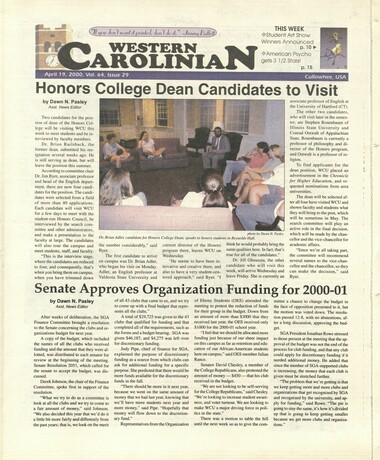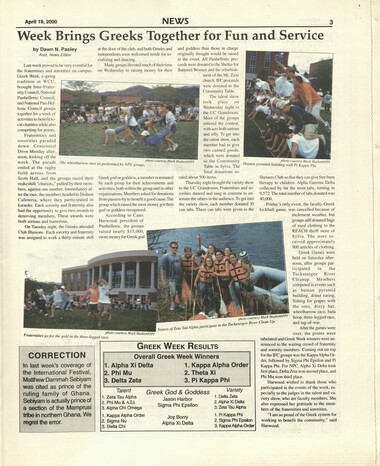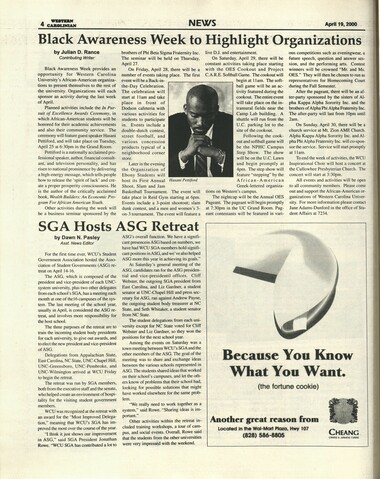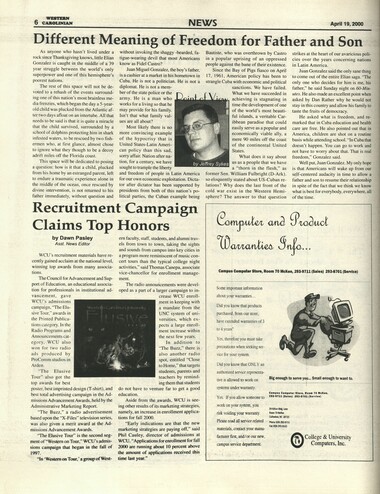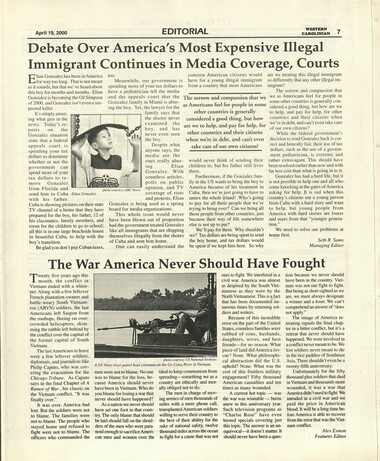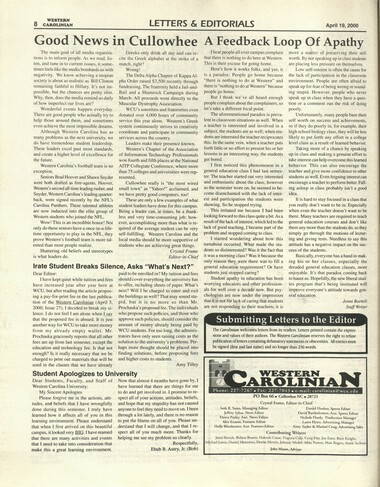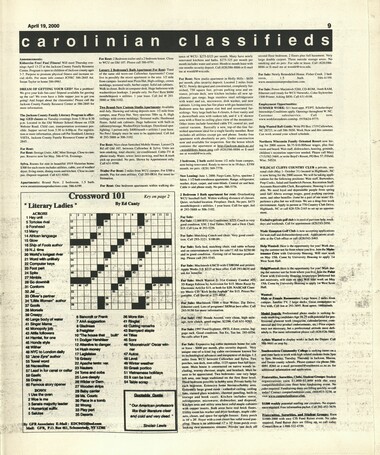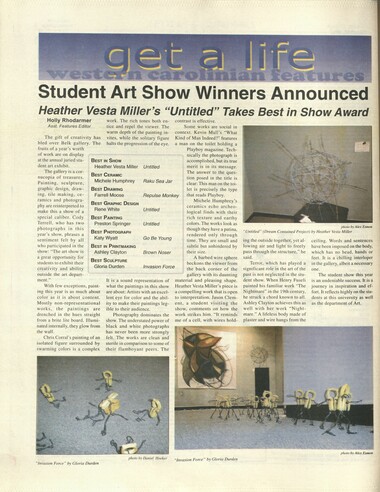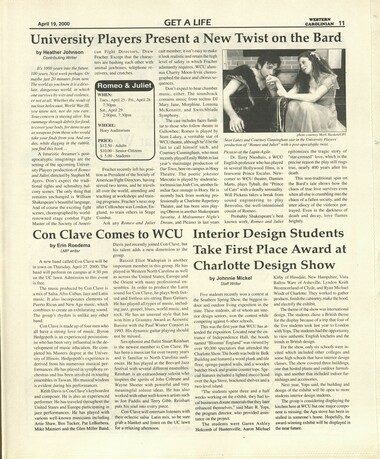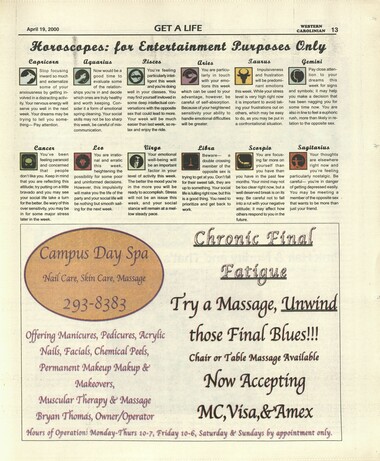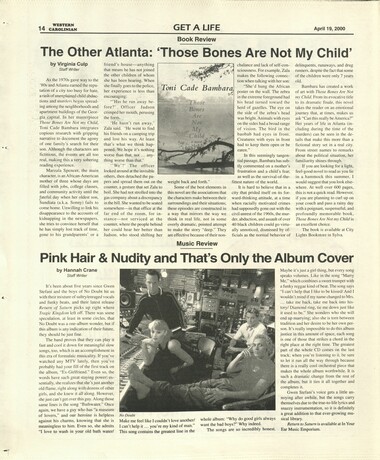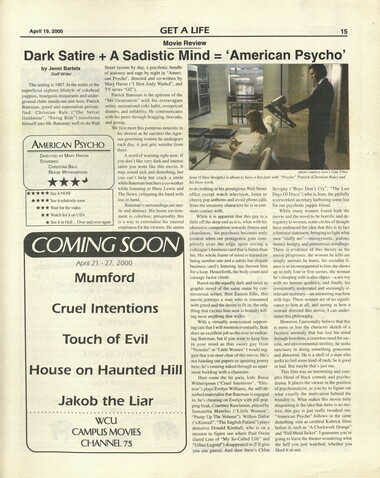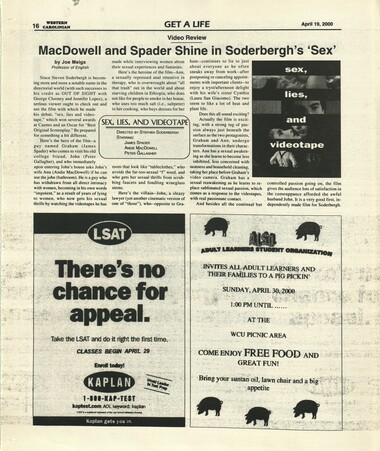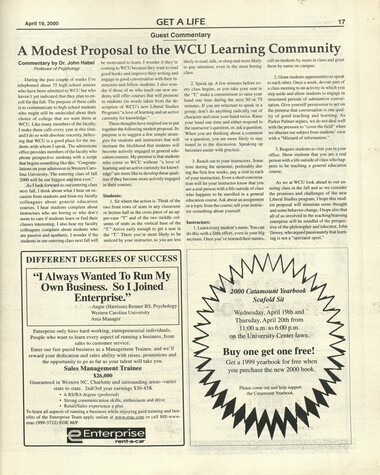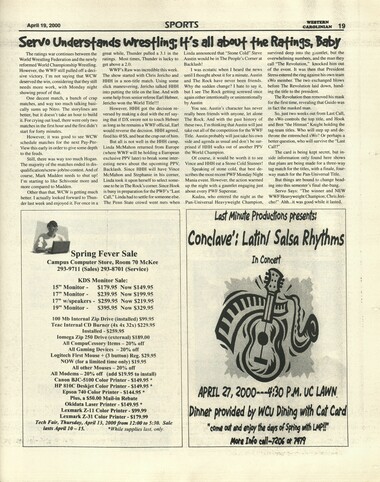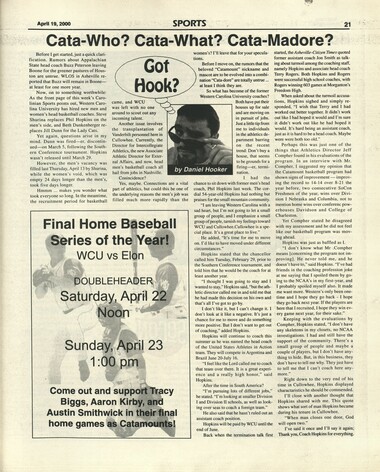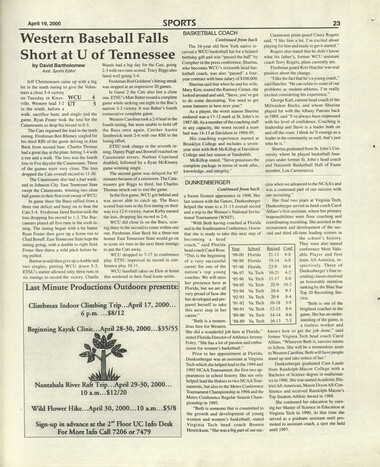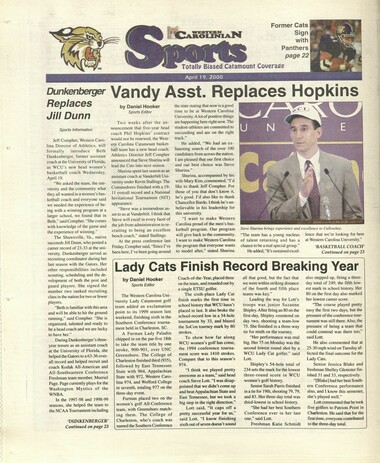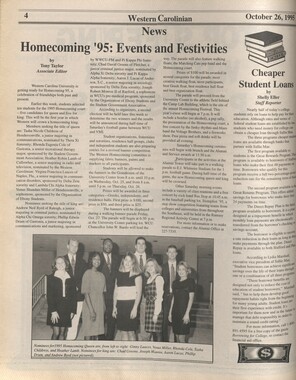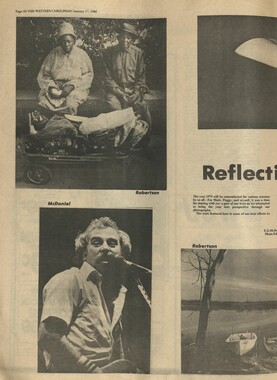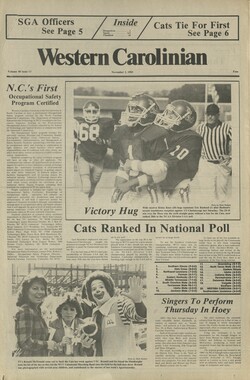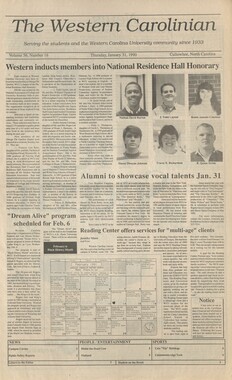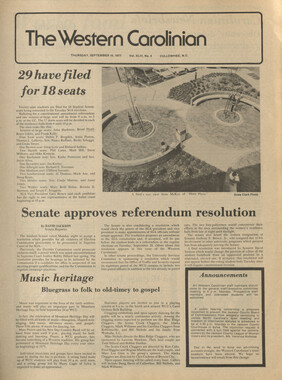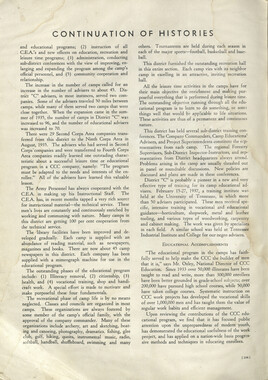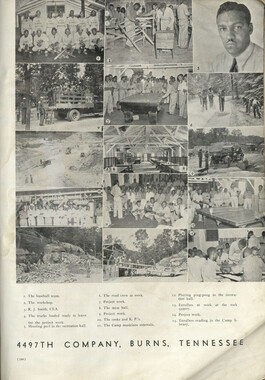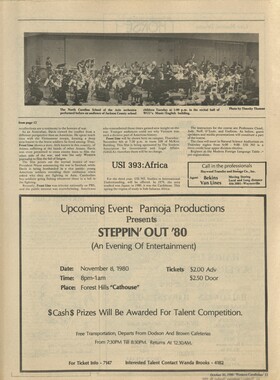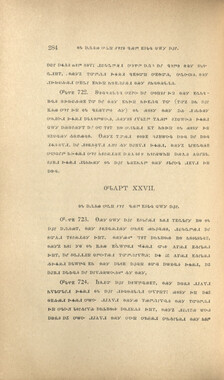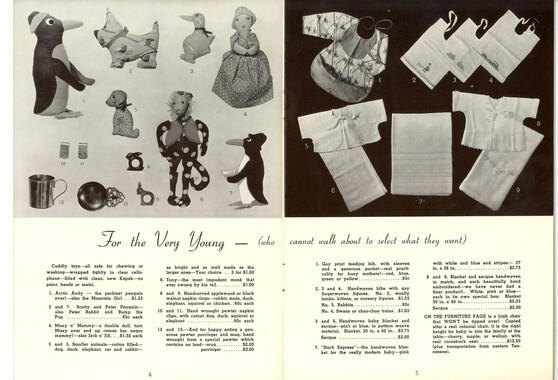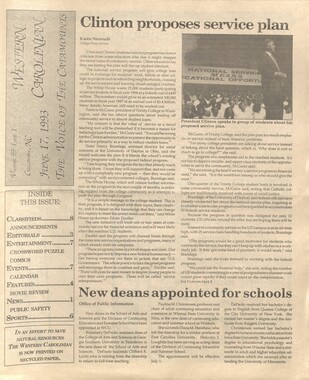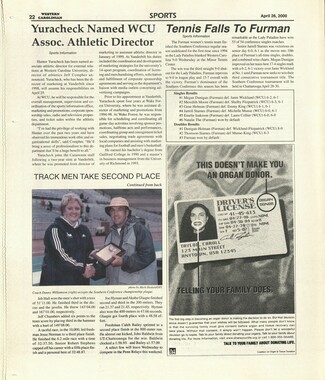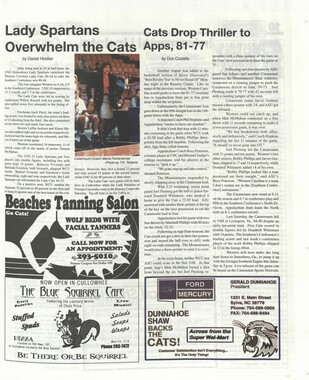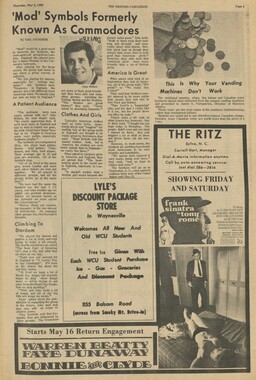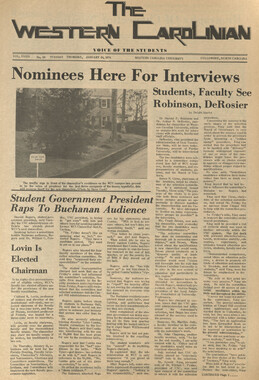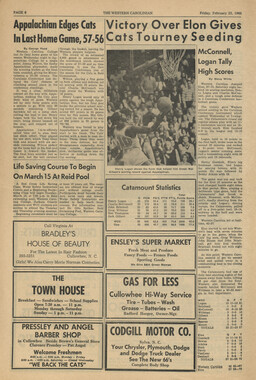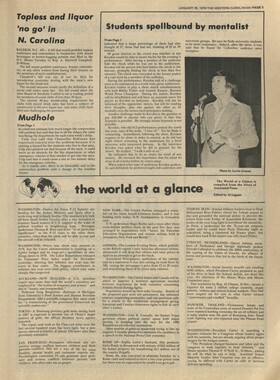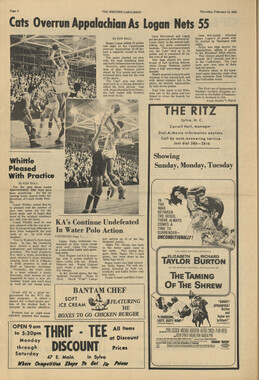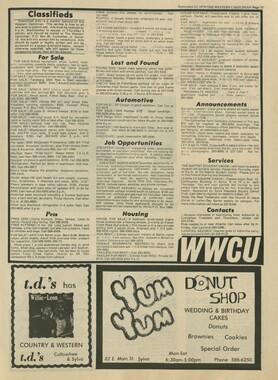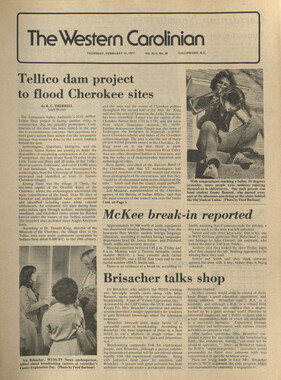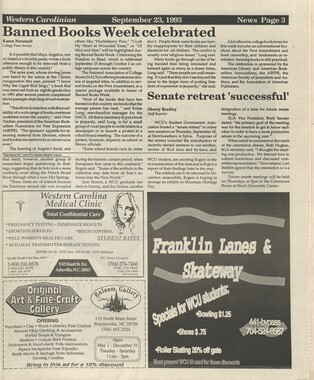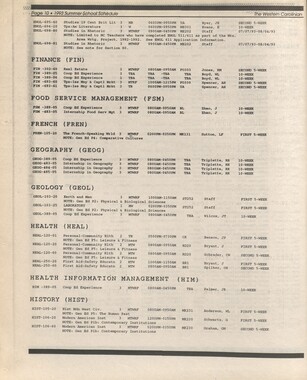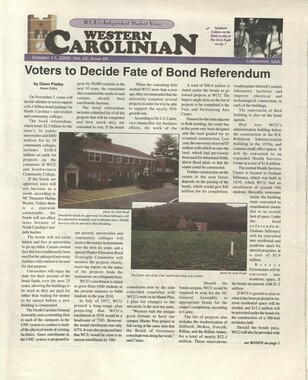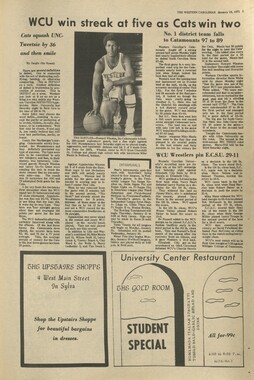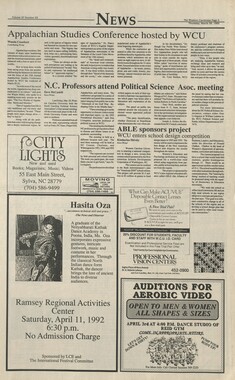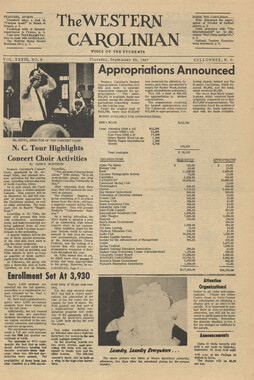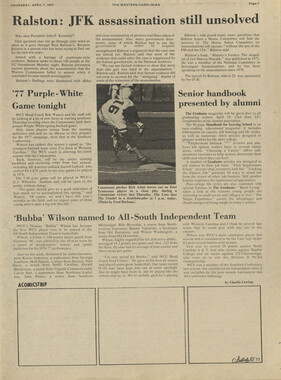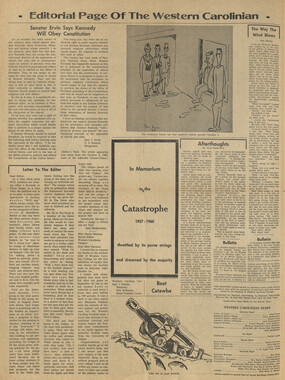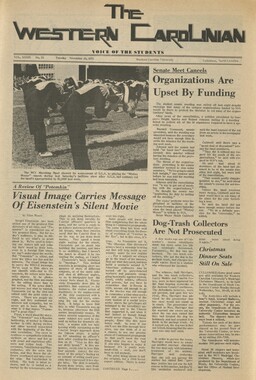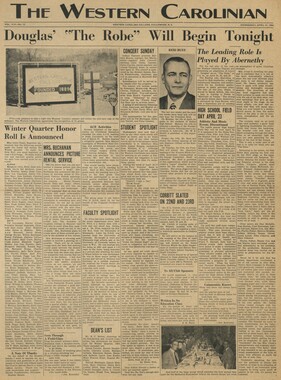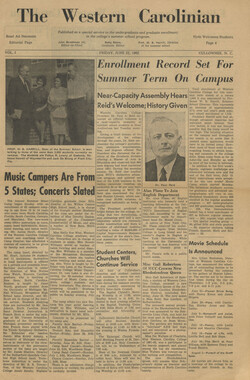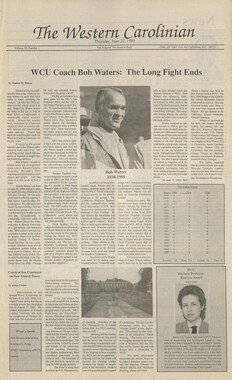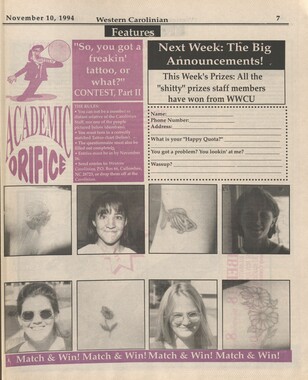Western Carolina University (20)
View all
- Canton Champion Fibre Company (2308)
- Cherokee Traditions (293)
- Civil War in Southern Appalachia (165)
- Craft Revival (1942)
- Great Smoky Mountains - A Park for America (2767)
- Highlights from Western Carolina University (430)
- Horace Kephart (941)
- Journeys Through Jackson (154)
- LGBTQIA+ Archive of Jackson County (19)
- Oral Histories of Western North Carolina (314)
- Picturing Appalachia (6679)
- Stories of Mountain Folk (413)
- Travel Western North Carolina (160)
- Western Carolina University Fine Art Museum Vitreograph Collection (129)
- Western Carolina University Herbarium (92)
- Western Carolina University: Making Memories (708)
- Western Carolina University Publications (2283)
- Western Carolina University Restricted Electronic Theses and Dissertations (146)
- Western North Carolina Regional Maps (71)
- World War II in Southern Appalachia (131)
University of North Carolina Asheville (6)
View all
- Allanstand Cottage Industries (62)
- Appalachian National Park Association (53)
- Bennett, Kelly, 1890-1974 (1295)
- Berry, Walter (76)
- Brasstown Carvers (40)
- Carver, George Washington, 1864?-1943 (26)
- Cathey, Joseph, 1803-1874 (1)
- Champion Fibre Company (233)
- Champion Paper and Fibre Company (297)
- Cherokee Indian Fair Association (16)
- Cherokee Language Program (22)
- Crowe, Amanda (40)
- Edmonston, Thomas Benton, 1842-1907 (7)
- Ensley, A. L. (Abraham Lincoln), 1865-1948 (275)
- Fromer, Irving Rhodes, 1913-1994 (70)
- George Butz (BFS 1907) (46)
- Goodrich, Frances Louisa (120)
- Grant, George Alexander, 1891-1964 (96)
- Heard, Marian Gladys (60)
- Kephart, Calvin, 1883-1969 (15)
- Kephart, Horace, 1862-1931 (313)
- Kephart, Laura, 1862-1954 (39)
- Laney, Gideon Thomas, 1889-1976 (439)
- Masa, George, 1881-1933 (61)
- McElhinney, William Julian, 1896-1953 (44)
- Niggli, Josephina, 1910-1983 (10)
- North Carolina Park Commission (105)
- Osborne, Kezia Stradley (9)
- Owens, Samuel Robert, 1918-1995 (11)
- Penland Weavers and Potters (36)
- Roberts, Vivienne (15)
- Roth, Albert, 1890-1974 (142)
- Schenck, Carl Alwin, 1868-1955 (1)
- Sherrill's Photography Studio (2565)
- Southern Highland Handicraft Guild (127)
- Southern Highlanders, Inc. (71)
- Stalcup, Jesse Bryson (46)
- Stearns, I. K. (213)
- Thompson, James Edward, 1880-1976 (226)
- United States. Indian Arts and Crafts Board (130)
- USFS (683)
- Vance, Zebulon Baird, 1830-1894 (1)
- Weaver, Zebulon, 1872-1948 (58)
- Western Carolina College (230)
- Western Carolina Teachers College (282)
- Western Carolina University (1794)
- Western Carolina University. Mountain Heritage Center (18)
- Whitman, Walt, 1819-1892 (10)
- Wilburn, Hiram Coleman, 1880-1967 (73)
- Williams, Isadora (3)
- Cain, Doreyl Ammons (0)
- Crittenden, Lorraine (0)
- Rhodes, Judy (0)
- Smith, Edward Clark (0)
- Appalachian Region, Southern (2393)
- Asheville (N.C.) (1886)
- Avery County (N.C.) (26)
- Blount County (Tenn.) (161)
- Buncombe County (N.C.) (1664)
- Cherokee County (N.C.) (283)
- Clay County (N.C.) (555)
- Graham County (N.C.) (233)
- Great Smoky Mountains National Park (N.C. and Tenn.) (478)
- Haywood County (N.C.) (3522)
- Henderson County (N.C.) (70)
- Jackson County (N.C.) (4692)
- Knox County (Tenn.) (25)
- Knoxville (Tenn.) (12)
- Lake Santeetlah (N.C.) (10)
- Macon County (N.C.) (420)
- Madison County (N.C.) (211)
- McDowell County (N.C.) (39)
- Mitchell County (N.C.) (132)
- Polk County (N.C.) (35)
- Qualla Boundary (981)
- Rutherford County (N.C.) (76)
- Swain County (N.C.) (2020)
- Transylvania County (N.C.) (247)
- Watauga County (N.C.) (12)
- Waynesville (N.C.) (68)
- Yancey County (N.C.) (72)
- Aerial Photographs (3)
- Aerial Views (60)
- Albums (books) (4)
- Articles (1)
- Artifacts (object Genre) (228)
- Biography (general Genre) (2)
- Cards (information Artifacts) (38)
- Clippings (information Artifacts) (191)
- Crafts (art Genres) (622)
- Depictions (visual Works) (21)
- Design Drawings (1)
- Drawings (visual Works) (184)
- Envelopes (73)
- Facsimiles (reproductions) (1)
- Fiction (general Genre) (4)
- Financial Records (12)
- Fliers (printed Matter) (67)
- Glass Plate Negatives (381)
- Guidebooks (2)
- Internegatives (10)
- Interviews (811)
- Land Surveys (102)
- Letters (correspondence) (1013)
- Manuscripts (documents) (619)
- Maps (documents) (159)
- Memorandums (25)
- Minutes (administrative Records) (59)
- Negatives (photographs) (5735)
- Newsletters (1285)
- Newspapers (2)
- Occupation Currency (1)
- Paintings (visual Works) (1)
- Pen And Ink Drawings (1)
- Periodicals (193)
- Personal Narratives (7)
- Photographs (12982)
- Plans (maps) (1)
- Poetry (5)
- Portraits (1657)
- Postcards (329)
- Programs (documents) (151)
- Publications (documents) (2237)
- Questionnaires (65)
- Scrapbooks (282)
- Sheet Music (1)
- Slides (photographs) (402)
- Sound Recordings (796)
- Specimens (92)
- Speeches (documents) (15)
- Tintypes (photographs) (8)
- Transcripts (322)
- Video Recordings (physical Artifacts) (23)
- Vitreographs (129)
- Text Messages (0)
- A.L. Ensley Collection (275)
- Appalachian Industrial School Records (7)
- Appalachian National Park Association Records (336)
- Axley-Meroney Collection (2)
- Bayard Wootten Photograph Collection (20)
- Bethel Rural Community Organization Collection (7)
- Blumer Collection (5)
- C.W. Slagle Collection (20)
- Canton Area Historical Museum (2110)
- Carlos C. Campbell Collection (282)
- Cataloochee History Project (65)
- Cherokee Studies Collection (4)
- Daisy Dame Photograph Album (5)
- Daniel Boone VI Collection (1)
- Doris Ulmann Photograph Collection (112)
- Elizabeth H. Lasley Collection (1)
- Elizabeth Woolworth Szold Fleharty Collection (4)
- Frank Fry Collection (95)
- George Masa Collection (173)
- Gideon Laney Collection (452)
- Hazel Scarborough Collection (2)
- Hiram C. Wilburn Papers (28)
- Historic Photographs Collection (236)
- Horace Kephart Collection (861)
- Humbard Collection (33)
- Hunter and Weaver Families Collection (1)
- I. D. Blumenthal Collection (4)
- Isadora Williams Collection (4)
- Jesse Bryson Stalcup Collection (47)
- Jim Thompson Collection (224)
- John B. Battle Collection (7)
- John C. Campbell Folk School Records (80)
- John Parris Collection (6)
- Judaculla Rock project (2)
- Kelly Bennett Collection (1314)
- Love Family Papers (11)
- Major Wiley Parris Civil War Letters (3)
- Map Collection (12)
- McFee-Misemer Civil War Letters (34)
- Mountain Heritage Center Collection (4)
- Norburn - Robertson - Thomson Families Collection (44)
- Pauline Hood Collection (7)
- Pre-Guild Collection (2)
- Qualla Arts and Crafts Mutual Collection (12)
- R.A. Romanes Collection (681)
- Rosser H. Taylor Collection (1)
- Samuel Robert Owens Collection (94)
- Sara Madison Collection (144)
- Sherrill Studio Photo Collection (2558)
- Smoky Mountains Hiking Club Collection (616)
- Stories of Mountain Folk - Radio Programs (374)
- The Reporter, Western Carolina University (510)
- Venoy and Elizabeth Reed Collection (16)
- WCU Gender and Sexuality Oral History Project (32)
- WCU Mountain Heritage Center Oral Histories (25)
- WCU Oral History Collection - Mountain People, Mountain Lives (71)
- WCU Students Newspapers Collection (1744)
- Western North Carolina Tomorrow Black Oral History Project (69)
- William Williams Stringfield Collection (2)
- Zebulon Weaver Collection (109)
- African Americans (388)
- Appalachian Trail (35)
- Artisans (521)
- Cherokee art (84)
- Cherokee artists -- North Carolina (10)
- Cherokee language (21)
- Cherokee pottery (101)
- Cherokee women (208)
- Church buildings (166)
- Civilian Conservation Corps (U.S.) (110)
- College student newspapers and periodicals (1830)
- Dams (95)
- Dance (1023)
- Education (222)
- Floods (60)
- Folk music (1015)
- Forced removal, 1813-1903 (2)
- Forest conservation (220)
- Forests and forestry (917)
- Gender nonconformity (4)
- Great Smoky Mountains National Park (N.C. and Tenn.) (154)
- Hunting (38)
- Landscape photography (10)
- Logging (103)
- Maps (84)
- Mines and mineral resources (8)
- North Carolina -- Maps (18)
- Paper industry (38)
- Postcards (255)
- Pottery (135)
- Railroad trains (69)
- Rural electrification -- North Carolina, Western (3)
- School integration -- Southern States (2)
- Segregation -- North Carolina, Western (5)
- Slavery (5)
- Sports (452)
- Storytelling (245)
- Waterfalls -- Great Smoky Mountains (N.C. and Tenn.) (66)
- Weaving -- Appalachian Region, Southern (280)
- Wood-carving -- Appalachian Region, Southern (328)
- World War, 1939-1945 (173)
Western Carolinian Volume 64 (65) Number 29
Item
Item’s are ‘child’ level descriptions to ‘parent’ objects, (e.g. one page of a whole book).
-
-
\Jf^tf< u Jrtt I u,j»/ il ft inly I, (Lit hit si. - latum} IJultelj) I WESTERN ^» aroliniaM THIS WEEK ^Student Art Show Winners Announced p. 10 ► ^American Psycho gets 3 112 Stars! p. 15 April 1 9, 2000, Vol. 64, Issue 29 Cullowhee, USA Honors College Dean Candidates to Visit by Dawn N. Pasley Asst. News Editor Two candidates for the position of dean of the Honors College will be visiting WCU this week to meet students and be interviewed by faculty members. Dr. Brian Railsback, the former dean, submitted his resignation several weeks ago. He is still serving as dean, but will leave the position this summer. According to committee chair Dr. Jim Byer, associate professor and head of the English department, there are now four candidates for the position. The candidates were selected from a field of more than 40 applications. Each candidate will visit WCU for a few days to meet with the student-run Honors Council, be interviewed by the search committee and other administrators, and make a presentation to the faculty at large. The candidates will also tour the campus and meet students, staff, and faculty. "This is the interview stage, where the candidates are reduced to four, and consequently, that's when you bring them on campus, when you have trimmed down photo by Dawn N. Pasley Dr. Brian Adler, candidate for Honors College Dean, speaks to honors students in Reynolds Hall. think he would probably bring the the number considerably," said Byer. The first candidate to arrive on campus was Dr. Brian Adler, who began his visit on Monday. Adler, an English professor at Valdosta State University and current director of the Honors program there, leaves WCU on Wednesday. "He seems to have been innovative and creative there, and also to have a very student-centered approach," said Byer. "I same qualities here. In fact, that's true for all of the candidates." Dr. Jill Ghnassia, the other candidate who will visit this week, will arrive Wednesday and leave Friday. She is currently an associate professor of English at the University of Hartford (CT). The other two candidates, who will visit later in the semester, are Stephen Rosenbaum of Illinois State University and Conrad Ostwalt of Appalachian State. Rosenbaum is currently a professor of philosophy and director of the Honors program, and Ostwalt is a professor of religion. To find applicants for the dean position, WCU placed an advertisement in the Chronicle for Higher Education, and requested nominations from area universities. The dean will be selected after all four have visited WCU and shown faculty and students what they will bring to the post, which will be sometime in May. The search committee will play an active role in the final decision, which will be made by the chancellor and the vice-chancellor for academic affairs. "Since we're all taking part, the committee will recommend several names to the vice-chancellor and the chancellor, so they can make the decision," said Byer. Senate Approves Organization Funding for 2000-01 by Dawn N. Pasley Asst. News Editor After weeks of deliberation, the SGA Finance Committee brought a resolution to the Senate concerning the clubs and organizations budget for next year. A copy of the budget, which included the names of all the clubs who received funding and the amount that they were allotted, was distributed to each senator for review at the beginning of the meeting. Senate Resolution 2051, which called for the senate to accept the budget, was discussed. Derek Johnson, the chair of the Finance Committee, spoke first in support of the resolution. "What we try to do as a committee is look at all the clubs and we try to come to a fair amount of money," said Johnson. "We also decided this year that we'd do it a little bit more fairly and differently from the past years; that is, we look on the merit of all 43 clubs that came to us, and we try to come up with a final budget that represents all the clubs." A total of $29,725 was given to the 43 clubs that qualified for funding and that completed all of the requirements, such as the forms and a budget hearing. SGA was given $46,187, and $4,275 was left over for discretionary funding. Jody Pipe, chief of finance for SGA, explained the purpose of discretionary funding as a source from which clubs can ask for additional funding for a specific purpose. She predicted that there would be more funds available for the discretionary funds in the fall. "There should be more in it next year, because we went on the same amount of money that we had last year, knowing that we'll have more students next year and more money," said Pipe. "Hopefully that money will flow down to the discretionary fund." Representatives from the Organization of Ebony Students (OES) attended the meeting to protest the reduction of funds for their group in the budget. Down from an amount of more than $3000 that they received last year, the OES received only $ 1000 for the 2000-01 school year. "I feel that we should be allocated more funding just because of our sheer impact on this campus as far as retention and education of our African-American students here on campus," said OES member Julian Ranee. Senator David Chesley, a member of the College Republicans, also protested the amount of money — $450 — that his club received in the budget. "We are not looking to be self-serving for the College Republicans," said Chesley. "We're looking to increase student awareness, and voter turnout. We are looking to make WCU a major driving force in politics in the state." There was a motion to table the bill until the next week so as to give the com mittee a chance to change the budget in the face of opposition presented to it, but the motion was voted down. The resolution passed 12-8, with no abstentions, after a long discussion, approving the budget. SGA President Jonathan Rowe stressed to those present at the meeting that the approval of the budget was not the end of the process for club funding, and that any club could apply for discretionary funding if it needed additional money. He added that since the number of SGA-supported clubs is increasing, the money that each club is given must be stretched further. "The problem that we're getting is that we keep getting more and more clubs and organizations that get recognized by SGA and recognized by the university, and apply for funding," said Rowe. "The pie is going to stay the same, it's how it's divided up that is going to keep getting smaller because we get more clubs and organizations." 1 I
Object
Object’s are ‘parent’ level descriptions to ‘children’ items, (e.g. a book with pages).
-
The Western Carolinian is Western Carolina University's student-run newspaper. The paper was published as the Cullowhee Yodel from 1924 to 1931 before changing its name to The Western Carolinian in 1933.
-
